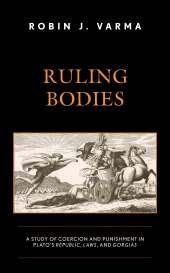Ruling Bodies : A Study of Coercion and Punishment in Plato's Republic, Laws, and Gorgias
100 p.
This book is about an epochal shift in ideas that changed the nature and meaning of coercion in modern political thought. It begins with a review of Foucault, Arendt, and Habermas, and points out a discrepancy in the way each thinker understood coercion in modern politics. From here, Varma examines Plato's Republic, Laws, and Gorgias to provide a framework and context for thinking about this. As the author shows, each work demonstrates a particular style of Platonic statecraft that corresponds to the amount of power the philosopher holds in a city. The Republic demonstrates the philosopher's rule as a monarch; the Laws demonstrates his rule when he must share power with a few spirited statesmen; and the Gorgias demonstrates his rule in a democracy where power belongs to the people. Ultimately, Varma argues that the philosopher used coercion as a supplementary tool to help harmonize man's soul with the heavens. When Hobbes recast the cosmos as matter in motion, however, power became the
highest ordering principle for political life. [Publisher's Text]
-
Información
ISBN: 9781978772885


